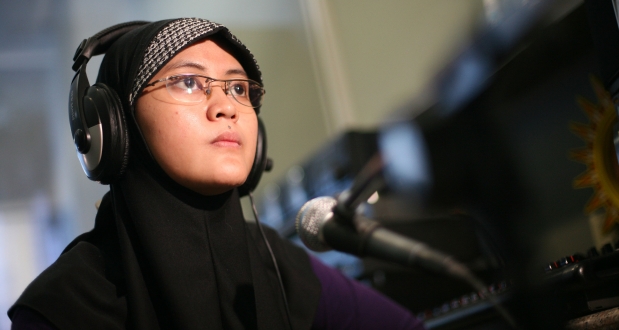- About
- Topics
- Picks
- Audio
- Story
- In-Depth
- Opinion
- News
- Donate
- Signup for our newsletterOur Editors' Best Picks.Send
Read, Debate: Engage.
| January 10, 2019 | |
|---|---|
| topic: | Women's rights |
| tags: | #Tanzania, #Sexism, #sanitation |
| partner: | NewsDeeply |
| located: | Tanzania |
For 32-year-old Lilian James, the biggest challenge of her job as an engineer is not the complex designs she prepares to replace the ageing waste-water and sanitation system of Tanzania’s largest city, but rather the increasing sexism she experiences in the workplace.
Yet James – who works with Dar es Salaam Water and Sewerage Authority (DAWASA) as an environmental engineer specializing in wastewater – is seemingly unfazed by the chauvinism of her male counterparts.
“Some people look down upon me just because I am a woman. When it comes to expertise, they are usually surprised by my ability to solve complex engineering problems,” she says.
Perched on a swivel chair, her eyes glued to a laptop screen, James scrolls through multiple complex engineering graphics while briskly scribbling details on a piece of paper laid out on a table beside her.
She is one of the few women in the East African country to have ventured into the male-dominated engineering field. In Tanzania, very few women hold technical engineering positions like this – ostensibly, observers say, due to a lack of motivation and a common belief that engineering is a no-go area for women. “It’s a very challenging job, especially when you are the only woman working among men,” she says.
Addressing Waste-Water Health Issues
Dar es Salaam is one of Africa’s fastest-growing cities and the majority of people who migrate there end up living in squalid conditions. According to the World Bank, 70 percent of the city’s 4.4 million inhabitants live in informal dwellings prone to waste-water pollution and epidemic diseases.
In Dar es Salaam city centre, the sewage networks are often wrecked by flooding during the rainy season. This forces stinking effluent up onto the streets and exposes city dwellers to pollutants, local residents say.
Lack of sanitation is one of the world’s leading development challenges. Globally, around two billion people lack access to appropriate sanitation, and around a billion have no toilet. While many city residents prefer flush toilets, the acute shortage of water in many areas makes this a distant dream.
Residents sometimes drain the sludge from their pit latrines into the Msimbazi River, contaminating both drinking and bathing water.
In the bustling Kigogo neighbourhood, James dressed in a shiny orange high-visibility jacket and a hard hat is supervising the construction of a new sewage system, local residents are constantly grappling with the wastewater that flows from toilets.
“We understand the problems that residents in this neighbourhood go through. The installation of a new sewage system goes along with modernization of the area, which entails relocating some residents,” she says.
Changing the Narrative
James says she doesn’t always feel valued, especially by her male colleagues. “People admire looking at engineering work but don’t always appreciate the people behind that creativity,” she says.
But, she says, the engineering profession is a good fit for ambitious and visionary women who are committed to changing the world, making it more renewable and sustainable. At the moment, it is a role with few women takers in Tanzania, who view it as an “unfriendly” career choice.
However, a new breed of young female engineers is changing the male-dominated narrative in the profession thanks to a special capacity-building program supported by the Norwegian government. Under the women-only Structured Engineers Apprenticeship Programme, groups of female engineers in Tanzania are being empowered and equipped with transferable skills to fully master their chosen careers.
The initiative, which started in 2003, has already bolstered the number of female engineers in the field significantly. According to Benedict Mukama, the assistant registrar of Tanzania’s engineering registration board, the $2-million five-year initiative has helped consolidate the expertise of more than 291 female engineers.
Rubhera Mato, associate professor at Ardhi University’s School of Environmental Sciences and Technology in Dar es Salaam, says the university’s commitment to mentoring women in water engineering is vital. “Female students need to see their role models performing somewhere to see their path to growth,” he says. “Having women faculty serve as mentors is important to foster the next generation of women engineers.”
Angela Shayo, an electrical engineer working for TEMESA, a Tanzanian government agency, sums up the issue succinctly: “We have a serious problem in this country. Men always think they are on top of everything, even things they are not capable of doing,”
“We aim to increase the number of women engineers and bridge the existing gender gap in the profession,” Mukama says.
This article originally appeared on Women's Advancement Deeply. You can find the original here.
By copying the embed code below, you agree to adhere to our republishing guidelines.
